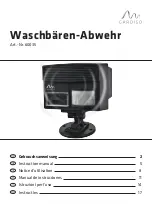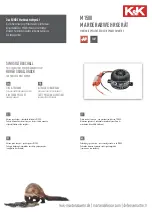
EQJW146F002 EN
79
Functions of the heating circuit
Outside the times-of-use, reduced set points are used for control: the reduced flow set point is
calculated as the difference between the adjusted values for 'Day set point' (rated room tem-
perature) and 'Night set point' (reduced room temperature). The 'Max. flow temperature' and
'Min. flow temperature' parameters mark the upper and lower limits of the flow temperature.
A separate gradient characteristic can be selected for the limitation of the return flow tem-
perature.
Examples for adjusting the characteristic:
− Old building, radiator design 90/70:
Gradient approx. 1.8
− New building, radiator design 70/55:
Gradient approx. 1.4
− New building, radiator design 55/45:
Gradient approx. 1.0
− Underfloor heating depending on arrangement:
Gradient smaller than 0.5
Particularly for control operation without room sensor, the room temperatures set for day
('Day set point') and night ('Night set point') only become effective satisfactorily when the
heating characteristic has been adapted to the building/heating surface layout.
Functions
WE
Configuration
Four-point characteristic
0
CO1, 2 > F11 - 0
Parameters
WE
Switch position: value range
Day set point
20.0 °C
: 0.0 to 40.0 °C
Night set point
15,0 °C
: 0.0 to 40.0 °C
Parameters
WE
Parameters: value range
Flow gradient
1.8*
PA1, 2 > P01: 0.2 to 3.2
Level (parallel shift)
0.0 °C
PA1, 2 > P02: –30.0 to 30.0 °C
Min. flow temperature
20.0 °C
PA1, 2 > P06: –5.0 to 150.0 °C
Max. flow temperature
90.0 °C*
PA1, 2 > P07: 5.0 to 150.0 °C
* With CO1, 2 > F05 - 1 the following
applies:
Gradient: 0.2 to 1.0 (1.0)
Max. flow temperature: 5.0 to 50.0 °C (50.0 °C)
Note
















































